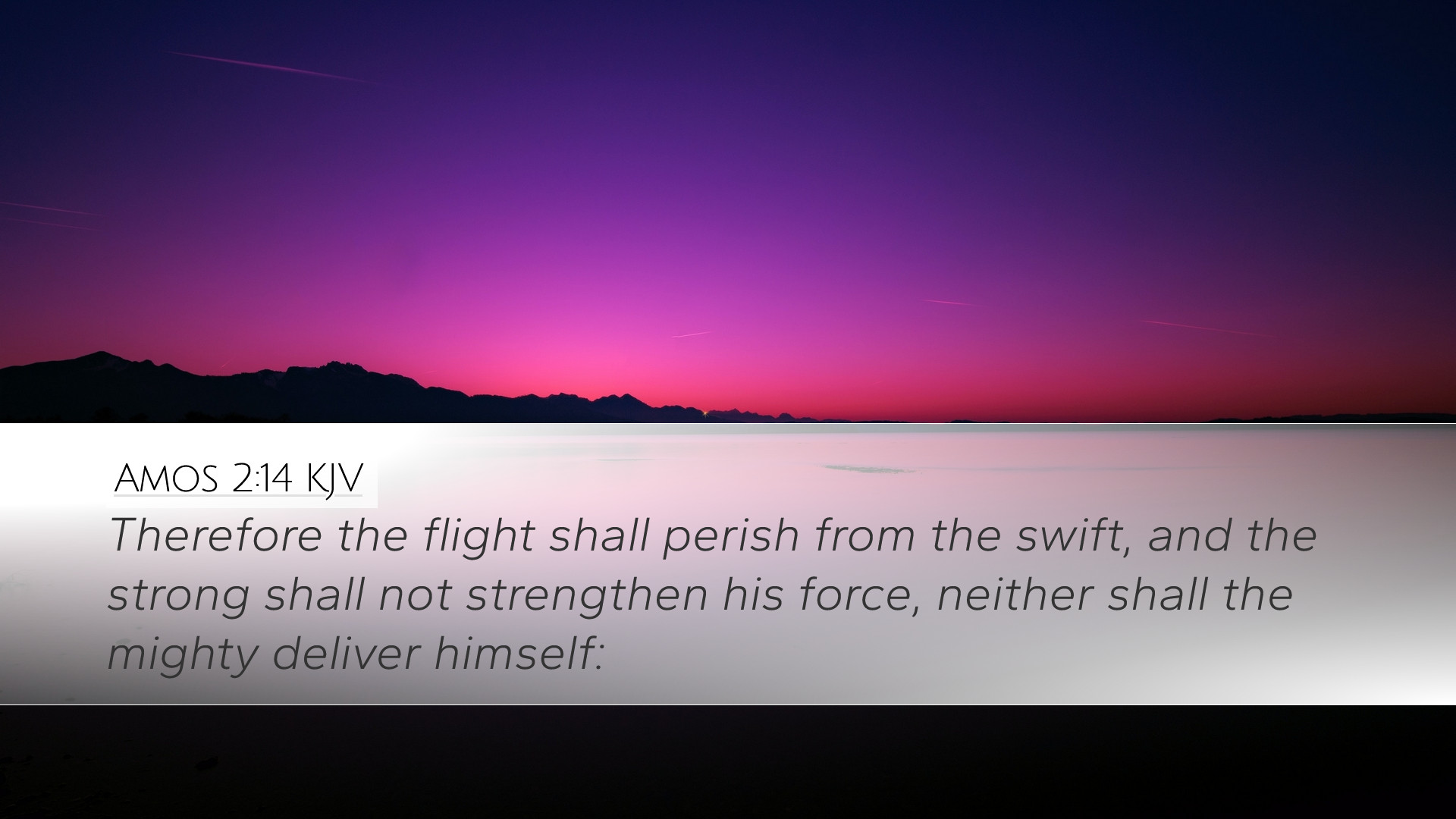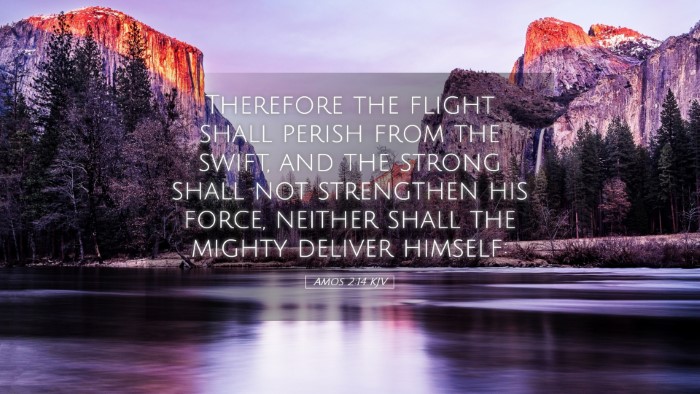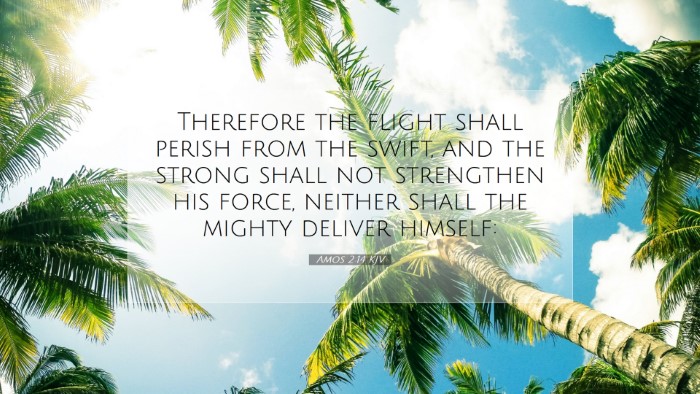Old Testament
Genesis Exodus Leviticus Numbers Deuteronomy Joshua Judges Ruth 1 Samuel 2 Samuel 1 Kings 2 Kings 1 Chronicles 2 Chronicles Ezra Nehemiah Esther Job Psalms Proverbs Ecclesiastes Song of Solomon Isaiah Jeremiah Lamentations Ezekiel Daniel Hosea Joel Amos Obadiah Jonah Micah Nahum Habakkuk Zephaniah Haggai Zechariah MalachiAmos 2:14
Amos 2:14 KJV
Therefore the flight shall perish from the swift, and the strong shall not strengthen his force, neither shall the mighty deliver himself:
Amos 2:14 Bible Commentary
Commentary on Amos 2:14
Verse: "Therefore the flight shall perish from the swift, and the strong shall not strengthen his force, neither shall the mighty deliver himself." (Amos 2:14)
Introduction
The Book of Amos, a prophetic text from the Old Testament, highlights the impending judgment on Israel due to their sins and social injustices. Chapter 2 focuses on God’s pronouncements against various nations, culminating in a direct warning to Israel. Verse 14 serves as a profound reminder of the futility of human strength and speed in the face of divine judgment.
Contextual Background
Amos, a shepherd and farmer from Tekoa, was called by God to prophesy to the Northern Kingdom of Israel during a time of relative prosperity, but also of moral decline and oppression. The surrounding chapters illustrate the social injustice, religious hypocrisy, and the imminent consequence of divine wrath. Verse 14 encapsulates a key theme: the inadequacy of human effort when confronted with the sovereign will of God.
Meaning of the Verse
Divine Intervention: This verse asserts the reality that no amount of human speed, strength, or might can avert God's judgment. It underscores the sovereignty of God over human affairs.
- The flight shall perish from the swift: This indicates that even those who are typically quick or agile cannot escape the judgment of God. Regardless of one’s ability to flee or evade, there is no escape from divine accountability.
- The strong shall not strengthen his force: Human strength is rendered impotent against divine decree. Those who rely solely on their physical abilities or power will find them of no use when God executes His judgment.
- Neither shall the mighty deliver himself: Despite one’s might or capacity to rescue themselves and others, when God’s judgment is pronounced, not even the strongest can deliver themselves from its effects.
Commentary Insights
Matthew Henry:
Matthew Henry emphasizes the certainty and inevitability of God’s judgments. He notes that there will be a day when all human resources will fail, and the mightiest will be utterly hopeless. Henry illustrates this by drawing parallels with the historical events where nations thought they could escape God’s judgment, only to find themselves overwhelmed and chastised.
Albert Barnes:
Barnes comments on the impression of helplessness that this verse portrays. He explicates that Israel, despite its apparent strength and military prowess, would find no refuge in their usual means during the coming judgment. Barnes outlines how this judgment extends beyond physical threats to encompass moral and spiritual failures, conveying a broader theological implication of reliance on God rather than oneself.
Adam Clarke:
Adam Clarke expands on the limitations of human endeavors in the wake of God’s plans. He notes that the imagery of flight and strength is used to express how futile human attempts at self-preservation are when God decides to act. Clarke also highlights the moral decay prevalent in Israel at the time and connects this decay with the reasons behind the coming judgment.
Theological Applications
This verse brings several theological implications for modern readers:
- Humility and Dependence on God: Believers are reminded of the necessity of relying on God rather than their own understanding or strength. In a world that often celebrates self-sufficiency, Amos 2:14 serves as a cautionary statement.
- Understanding Divine Sovereignty: This text reinforces the belief in God's sovereignty over human affairs, guiding theological discussions regarding the interplay of divine providence and human action.
- Moral Accountability: The judgment portrayed in this verse extends beyond individual lives to encompass entire communities. The church today must reflect on its societal role and the moral outcomes of its witness.
Conclusion
Amos 2:14 serves as a poignant reminder of the limitations of human strength and the inevitability of God's judgment. For pastors, students, theologians, and scholars, it prompts deep reflection on the need for humility, the assessment of moral responsibility, and the importance of reliance on divine mercy rather than human effort. As we navigate through our lives and communities, this verse challenges us to examine where we place our trust and how we engage with the world around us.


